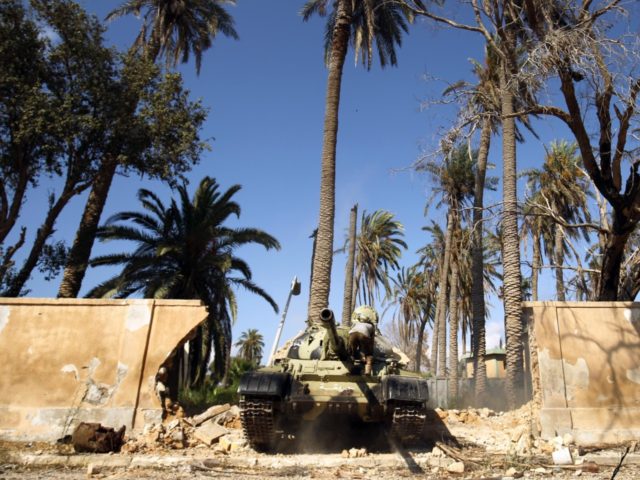Libyan warlord Khalifa Haftar, commander of the so-called Libyan National Army (LNA), commenced his march on Tripoli Thursday, capturing a town only 60 miles south of the national capital and headquarters of the U.N.-backed, internationally recognized Government of National Accord (GNA). The GNA issued military alerts as skirmishes were reported between its forces and the LNA vanguard.
“We fully control Gharyan and right now as we speak I’m driving through the town,” Haftar’s western operations commander Abdelsalam al-Hassi told Reuters in a telephone interview on Thursday. LNA forces struck from their eastern base of Benghazi to seize the town with surprising speed.
“I am sipping coffee now in Gharyan,” the jaunty LNA commander later informed the Associated Press. “God willing, we will enter the rest of the cities without clashes.”
“The town now is under control of the army who came from the east and I can see their vehicles with their Libyan National Army logo,” a local eyewitness confirmed to Reuters.
A Gharyan city official contacted by Bloomberg News denied the LNA was in control of his town and insisted Haftar’s forces pulled back after a brief scuffle, but he also “declined to be identified fearing reprisals,” which somewhat undermines his statement of defiance.
A spokesman for the LNA said there were “clashes south of Tripoli” on Wednesday with forces loyal to Prime Minister Fayez al-Serraj. He did not specify the size of the engagements or estimate casualties, but a Gharyan city official said one person was killed in the fighting.
“A vanguard of our armed forces reached Gharyan and its residents have come out to welcome them,” LNA spokesman Ahmed al-Mismari announced.
At a news conference on Wednesday, Mismari predicted the women of Tripoli will “ululate when welcoming the heroes” of the LNA, “just as they ululated in Benghazi and Derna,” which would suggest the LNA intends to continue its drive westward until its forces enter the capital.
The LNA has its own Facebook page, upon which it ominously declared early Wednesday that its forces were headed for “the western region to cleanse it of the remaining terrorist groups.” This was accompanied by video of an armored column rolling somewhere, although the date and location of the video could not immediately be verified.
Prime Minister Serraj ordered his own forces to prepare to “face all threats,” including “terrorist groups, criminals, outlaws, and all who threaten the security of every Libyan city.”
He described Haftar’s advance as a serious “escalation” and called on the LNA to “stop using the language of threats.”
Adding to the delicacy of the situation is the fact that U.N. Secretary-General Antonio Guterres happens to be in Tripoli at the moment, having arrived in advance of a scheduled April 14 summit sponsored by the United Nations to work out a peaceful political solution to the eight-year Libyan civil war. It looks as if Khalifa Haftar might be arriving early as well, with a much larger entourage.
Guterres took to Twitter to appeal for restraint on all sides:
I am deeply concerned by the military movement taking place in Libya and the risk of confrontation. There is no military solution. Only intra-Libyan dialogue can solve Libyan problems. I call for calm and restraint as I prepare to meet the Libyan leaders in the country.
— António Guterres (@antonioguterres) April 4, 2019
The European Union also voiced its concerns about “the military buildup underway in Libya and the escalatory rhetoric which seriously risks leading to an uncontrollable confrontation.”
The Trump administration has been fairly quiet about Libya. A joint statement with France, Italy, and the United Kingdom was released on March 1 by the U.S. State Department calling for a “de-escalation” of tensions in Libya and congratulating Haftar and Sarraj for holding a productive meeting in February. The joint statement insisted there is “no military solution in Libya.”
President Trump nominated a new ambassador to Libya on Tuesday, career diplomat and veteran foreign policy adviser Richard Norland. The U.S. has not dispatched an ambassador to Libya since late 2017.
Libya experts confess they are uncertain what will happen next. The general consensus is that Haftar has the advantage but could only capture Tripoli with a bloody and destructive assault he is probably reluctant to initiate, even if he feels confident the U.S., U.N., and other outside forces would not intervene. It would be remarkable if Haftar was willing to commence shelling Tripoli while the U.N. secretary-general watched from his hotel window.
This calculus could change rapidly if a sizable portion of the loosely-organized militia forces defending Tripoli switch allegiance to Haftar or depart as he advances, a possibility that has often been rumored.
The smart money says Hafter is merely rattling his saber and pressuring the GNA and United Nations to make a deal highly favorable to his LNA and the political forces it supports, including the rival self-declared national government based in Tobruk, the “House of Representatives” (HoR).
Gharyan might prove to be the Libyan Rubicon, the line that changes everything if Haftar crosses it and moves even close to Tripoli. Heated rhetoric is not always accompanied by proportionate action in the Middle East, but it might be difficult for the LNA to back down after describing Tripoli as a city infested by “terrorists” it needs to cleanse.

COMMENTS
Please let us know if you're having issues with commenting.